
Join MACS for HD A/C Boot Camp!
April 5, 2024
by: Alexa Murphy Membership, Events, & Marketing Assistant @ MACS Have you heard? MACS is going to be hosting an exclusive two-day boot camp live at the MACS headquarters! The...Read Article >

European Chemicals Agency (ECHA) accepting comments on PFAS rules
September 13, 2023
The European Chemicals Agency (ECHA) continues to accept comments on the proposed use restrictions to thousands of chemicals commonly found in automotive and other applications related to PFAS. PFAS stands...Read Article >

Refrigerant Deja Vu (Part Deux)
May 30, 2023
By Richard Hawkins, MACS Technical Contributor This is the second of two articles about the transition from R-134a to R-1234yf refrigerant. Part 1: Refrigerant Deja Vu – May 8th The...Read Article >
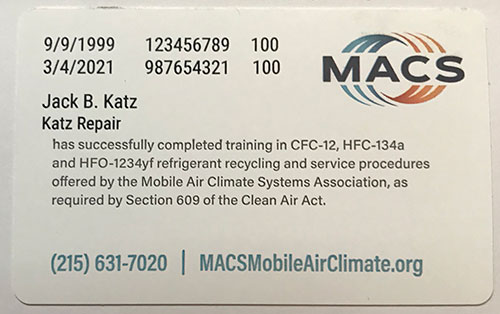
What does a MACS Section 609 card look like?
March 10, 2022
MACS occasionally receives reports from the field of a technician being refused purchase of refrigerant for not having a proper Section 609 card. Usually this is due to the technician not producing the right card or the counterperson not understanding what a MACS Section 609 card looks like. What does a MACS Section 609 card look like?Read Article >
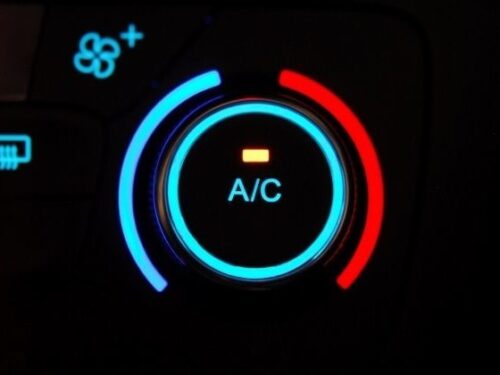
Refrigerant supply, pricing and safety
March 8, 2022
What I'm hearing about refrigerant supply and pricing this year reminds me of a similar period in the mid-2000s. It was springtime, just before the start of A/C season. Supplies of R-134a were tight and the price had come close to tripling from the prior year.Read Article >

Checking for refrigerant contamination
February 24, 2022
A large percentage of MACS members have refrigerant identifiers and use of them on vehicles that come into their shop for A/C service prior to beginning any service work is standard procedure. However, there are a lot of non-MACS member shops who do not have identifiers and unfortunately are not aware of the potential issues which can be caused by refrigerant contamination.Read Article >
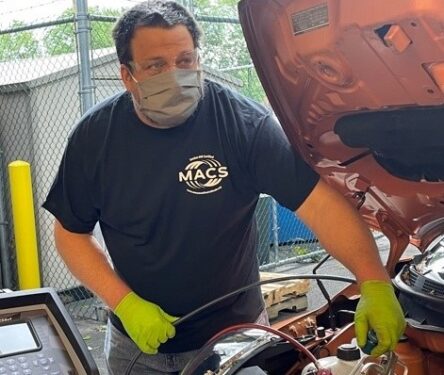
Correcting user error
February 15, 2022
As mentioned in last week's article, the first thing I did with the machine was check the pressure of the refrigerant in the tank. It was extremely high (well over 400 PSI) indicating there was a refrigerant contamination problem.Read Article >

Air contamination in an A/C system can ruin your day
February 2, 2022
I had a memorable encounter with air contamination in the mid 1990s. I was conducting a lot of retrofit clinics at the time and had recently acquired a demo refrigerant identifier which I took to those clinics. At one clinic, there was a technician who was extremely interested in the refrigerant identifier.Read Article >
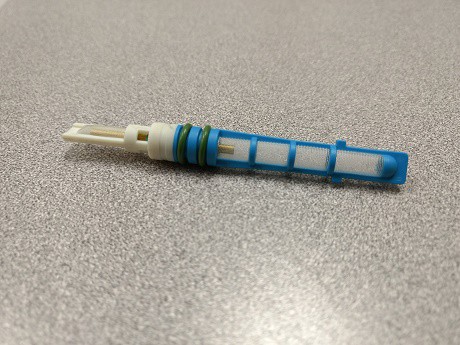
Top three tips on orifice tube behavior
July 20, 2021
In the last four MACS blog articles we covered a lot of detailed information about orifice tube system behavior. We examined a system with a full refrigerant charge verses a 25% undercharge. Now it is time to condense it all down into three important takeaways.Read Article >

Low refrigerant charge and the search for real data
June 22, 2021
I had read about how low refrigerant charges could increase compressor operating temperatures and decrease the amount of oil flowing to compressors, but I had never been able to find results from any tests. After discussing this with MACS, we decided to do some testing to get some real data.Read Article >
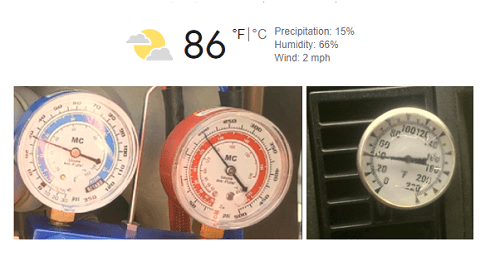
Refrigerant capacity and mobile A/C service: part 2
June 15, 2021
One of the most frequently asked questions on tech help-line calls concerns refrigerant capacity: How much refrigerant is in that mobile A/C system, and have you checked to be sure the refrigerant is pure?Read Article >

Refrigerant capacity and mobile A/C service
June 8, 2021
One of the most frequently asked questions on tech help-line calls is: How much refrigerant is in that mobile A/C system, and have you checked to be sure the refrigerant is pure?Read Article >
